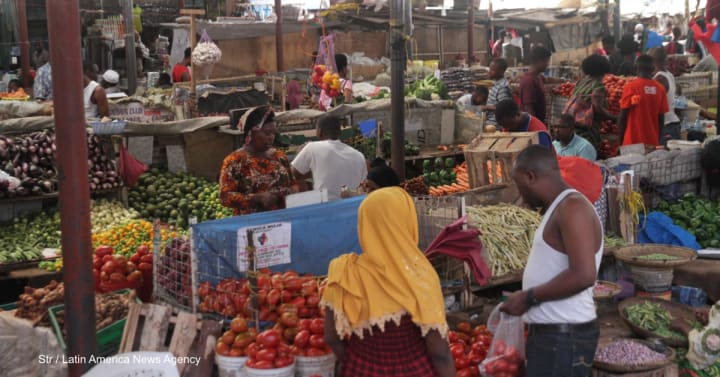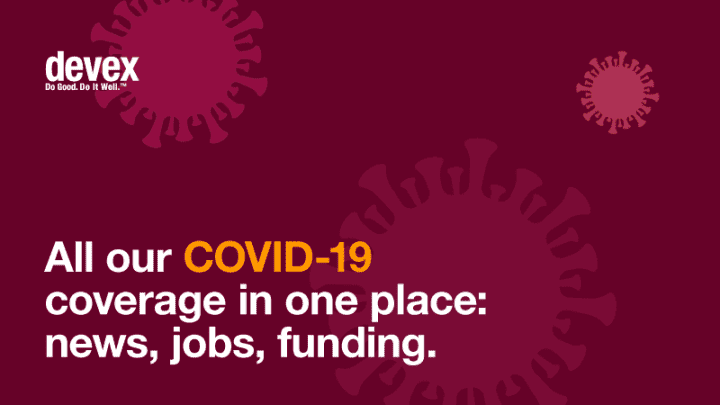The countries that don’t want the COVID-19 vaccine

Last month, Tanzanian Health Minister Dorothy Gwajima held a press conference demonstrating how to make a smoothie with ginger, onions, lemon, and pepper, which she said could help to prevent COVID-19 infections. She did not provide any evidence for her claim but went on to state that the country had no plans to receive vaccines for the pandemic and should instead rely on hygiene measures, herbal steaming, exercise, and “natural remedies.”
Sign up for Devex CheckUp
The must-read weekly newsletter for exclusive global health news and insider insights. Launching March 11.
A few weeks later, World Health Organization Director-General Tedros Adhanom Ghebreyesus issued a statement calling the lack of COVID-19 response in Tanzania “very concerning” and urging the country to implement public health measures and to prepare for vaccination.
Though President John Magufuli had previously denied the presence of the coronavirus in the country, last month he acknowledged that the virus was circulating and encouraged people to wear masks. However, he called for prayer rather than lockdowns to tackle the crisis and warned against the use of vaccines, suggesting Tanzanians would be used as “guinea pigs.”
Speculation is currently rife that Magufuli himself may have been diagnosed with COVID-19, after two weeks in which he’s made no public appearances.
As the COVAX Facility, the initiative to ensure equitable access to COVID-19 vaccines, begins to roll out doses in Africa, it’s unclear what will happen in countries that long denied COVID-19’s very existence — or claim to have already solved the problem.
Though Tanzania has received widespread criticism for its policy of virus denial, it is not the only African country that has not moved to acquire vaccines. According to Dr. Richard Mihigo, program area manager for immunization and vaccine development at WHO’s Regional Office for Africa, four countries that qualify for free vaccines under the COVAX advance market commitment financing instrument — Tanzania, Madagascar, Burundi, and Eritrea — have not yet completed the necessary requirements.
“It’s unfortunate for their citizens, it’s unfortunate for their neighbors, and it’s unfortunate for the globe because it specifically says that they are not following science.”
— Dr. Githinji Gitahi, chief executive officer, Amref Health Africa
Public health experts have called on such countries to follow scientific evidence and give their citizens the option to choose whether they want to be vaccinated. Tanzania and Madagascar have been clear about not wanting to participate in the COVAX initiative, Mihigo said, while Burundi and Eritrea have indicated that they are still going through the documentation.
“I think it’s Madagascar and Tanzania where things are quite clear,” he said, “But [Burundi and Eritrea] might take the right direction.”
Officials at the health ministries in Tanzania and Madagascar did not immediately respond to requests for comment.
Last year, a spokesperson for the Madagascar government had reportedly indicated that the country would not participate in COVAX and would instead continue to use a kind of traditional medicine developed in the country. Known as COVID-Organics, it is available in tea and pill form and has been touted as both a cure and treatment for COVID-19 by President Andry Rajoelina.
Dr. Githinji Gitahi, chief executive officer at Amref Health Africa, said that a country’s decision not to vaccinate may not stay within its borders.
“It’s unfortunate for their citizens, it’s unfortunate for their neighbors, and it’s unfortunate for the globe because it specifically says that they are not following science,” he said. “And that means that even if the neighboring countries get vaccinated, these particular populations could end up becoming a breeding ground for mutations of concern, and these mutations could then affect the rest of the world by probably escaping vaccines.”
Despite these concerns, Dr. Shadrack Mwaibambe, president of the Medical Association of Tanzania, said that while inoculation is unavoidable in his view, Tanzania should be cautious when selecting a vaccine.
Get development’s most important headlines in your inbox every day.
Thanks for subscribing!
“At this juncture of the outbreak, vaccination is inevitable, but … I think there is a need for due diligence to go through all these vaccines and to choose which one is suitable for Tanzania,” he said, expressing concern over the possibility that approval processes are being rushed.
“There is no deadline to say, ‘After certain months, the whole world must be vaccinated.’ … First of all, we must ask ourselves why emergency approval [of vaccines was given] and not full approval,” he said. “Emergency approval means there are some things they are not sure about. They are not sure about the safety and efficacy of vaccination in two years to come or in one year to come.”
According to WHO, the emergency use listing procedure balances the urgency of a public health crisis with a rigorous approval process from independent experts, who assess data on safety and efficacy.
But vaccine hesitancy in Madagascar and Tanzania goes beyond official channels. Citizens in these countries — perhaps influenced by months of anti-vaccine rhetoric from their politicians — also say they have or once had reservations about the COVID-19 vaccines available. Joe Banda, a 24-year-old intern, said that although he was initially hesitant about getting inoculated because of conspiracy theories surrounding COVID-19, he is now open to the idea.
“If a vaccine was to be readily available and free, I would have no issue with getting vaccinated against COVID,” he said.
Banda’s name has been changed to protect his identity, as the Tanzanian government has previously clamped down on those sharing information about COVID-19. Last year, the country updated its Electronic and Postal Communications (Online Content) Regulations to prohibit the publication of “content with information with regards to the outbreak of a deadly or contagious diseases in the country or elsewhere without the approval of the respective authorities.”
In Madagascar, 39-year-old civil society leader Paubert Tsimanaoraty Mahatante said if he had the choice, he would not get vaccinated. But he fears that vaccination certificates will become necessary for travel and that inoculation will become impossible to avoid, he said. Still, the origin of a vaccine matters to him; he said he would prefer a vaccine developed in Madagascar over a foreign one.
Mihigo said countries are disadvantaging their citizens by not participating in COVAX, as this may lead to international organizations that work in these countries acquiring vaccines for their staffers while citizens are left behind.
“That is against all the principles of equity we are trying to promote to make sure that everyone can get access to vaccines,” he said. “We need to give the choice to the people to decide on their own health.”
Devex East Africa Correspondent Sara Jerving contributed to this piece.

Printing articles to share with others is a breach of our terms and conditions and copyright policy. Please use the sharing options on the left side of the article. Devex Pro subscribers may share up to 10 articles per month using the Pro share tool ( ).


